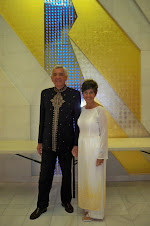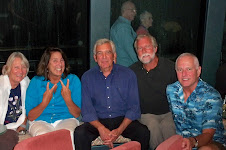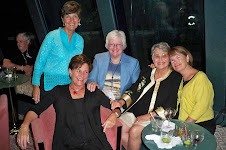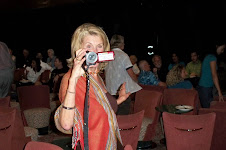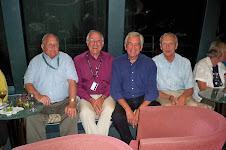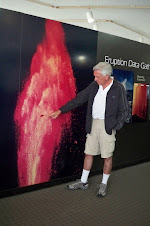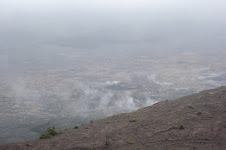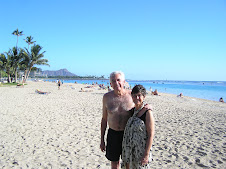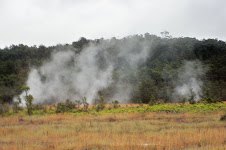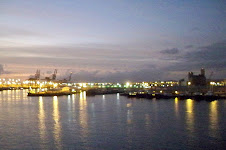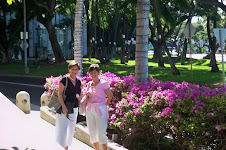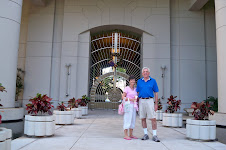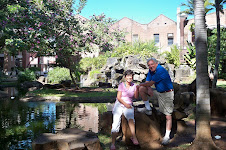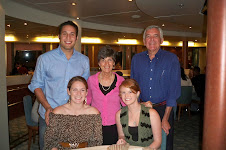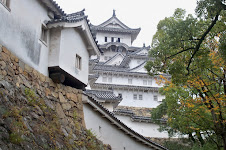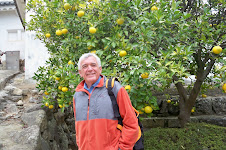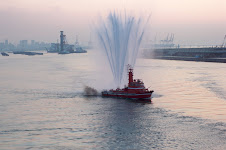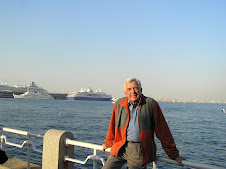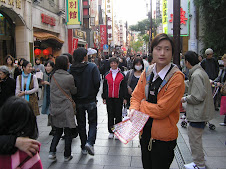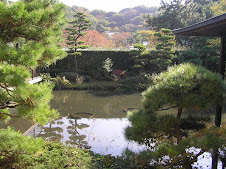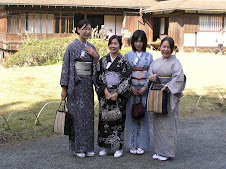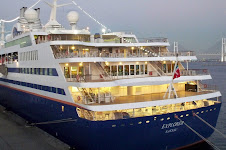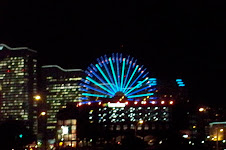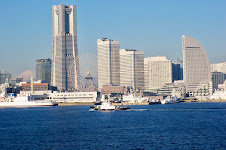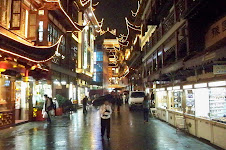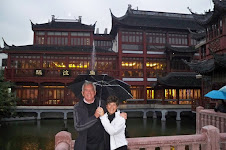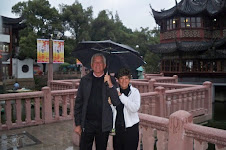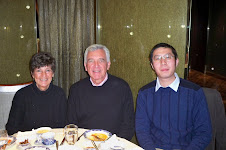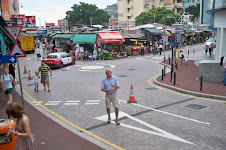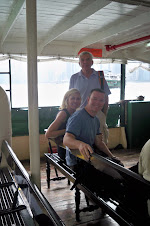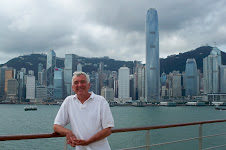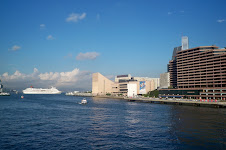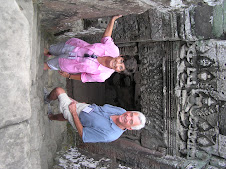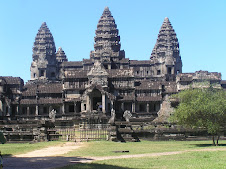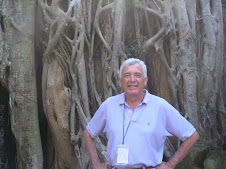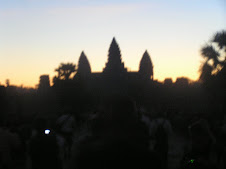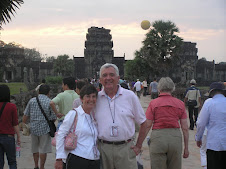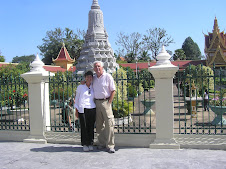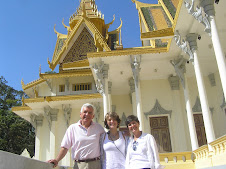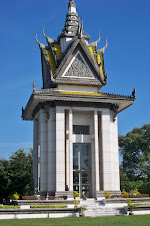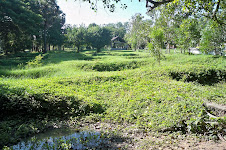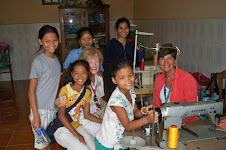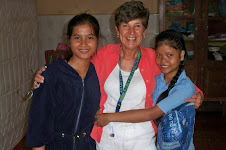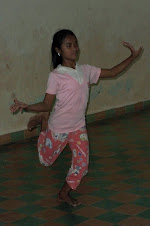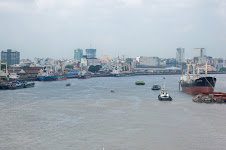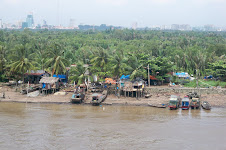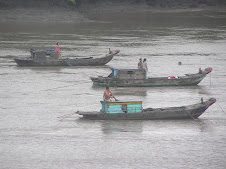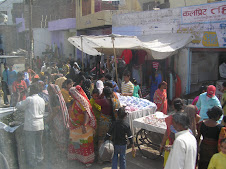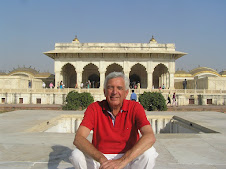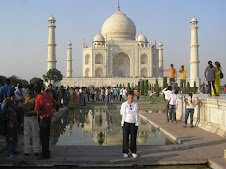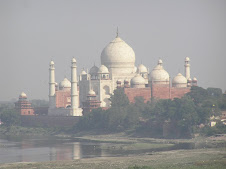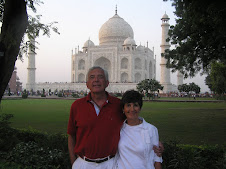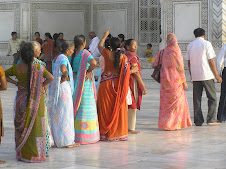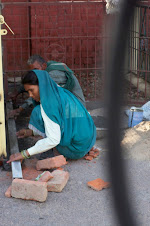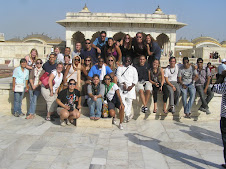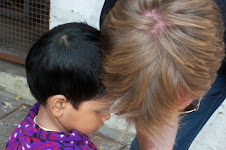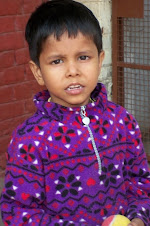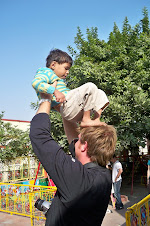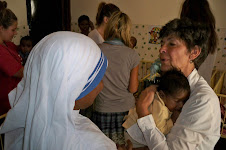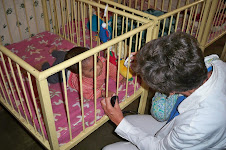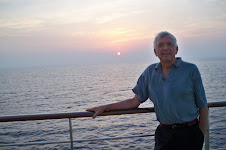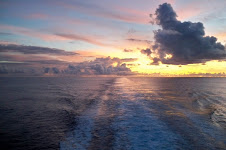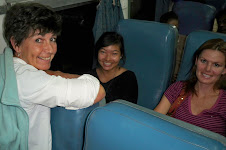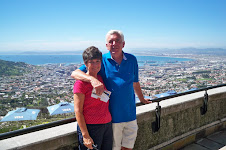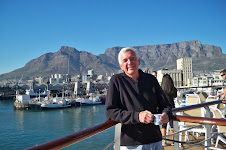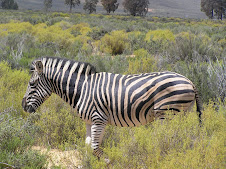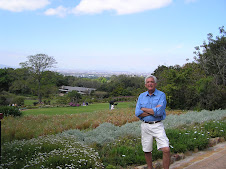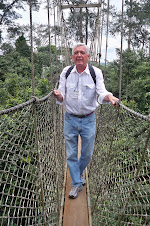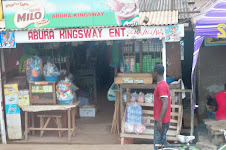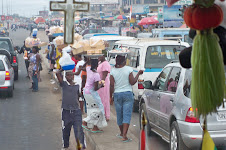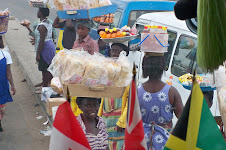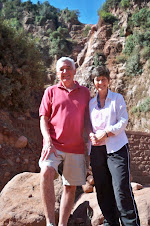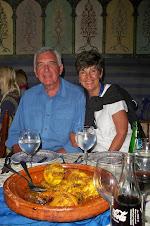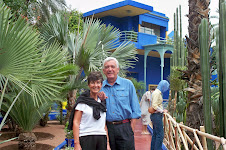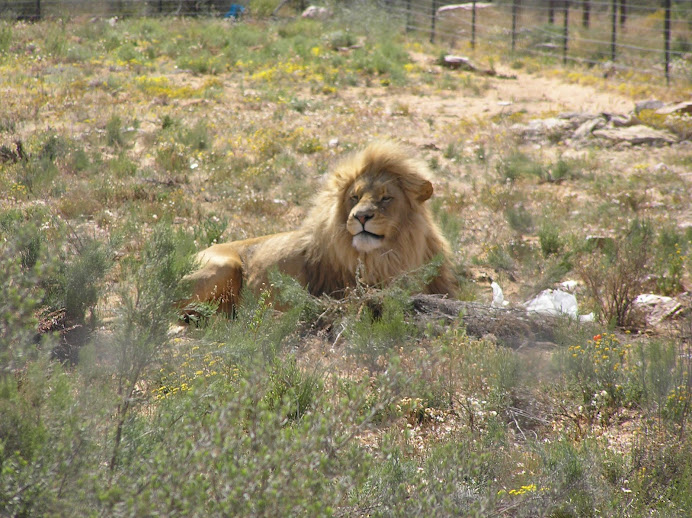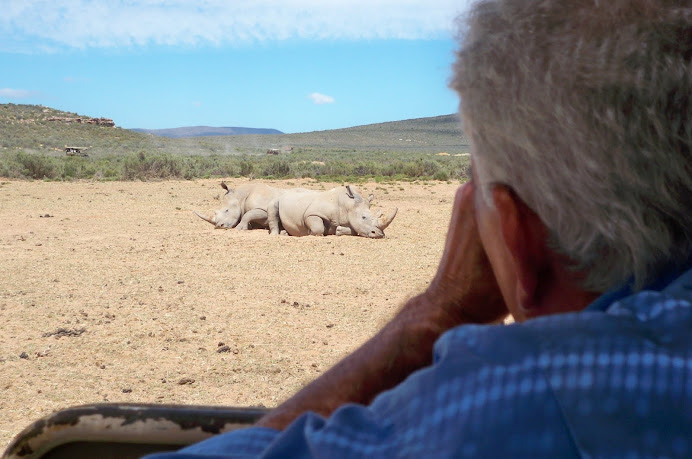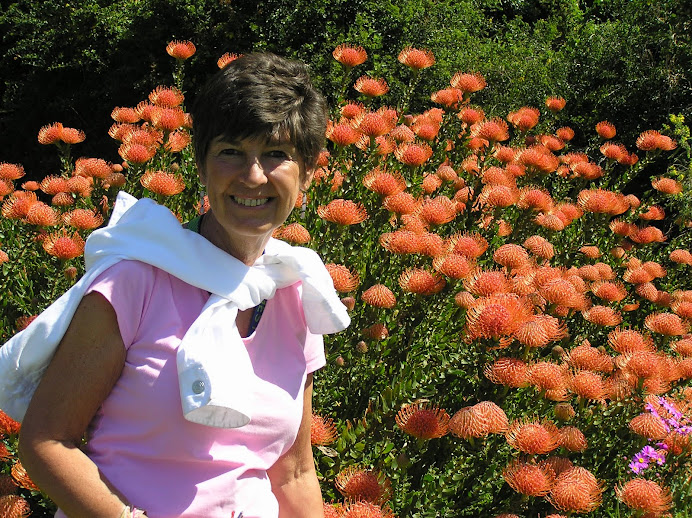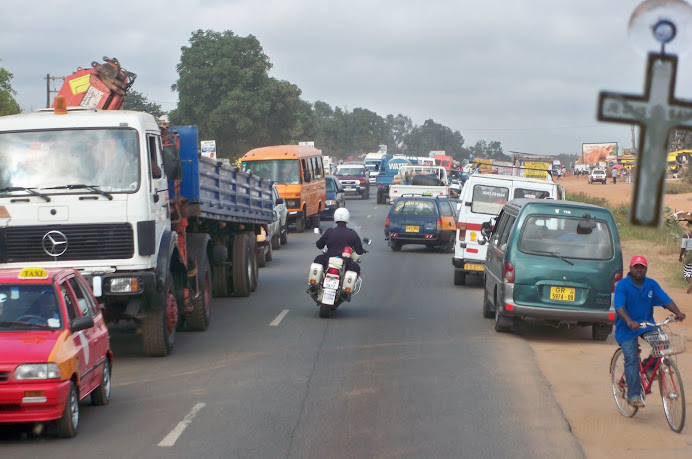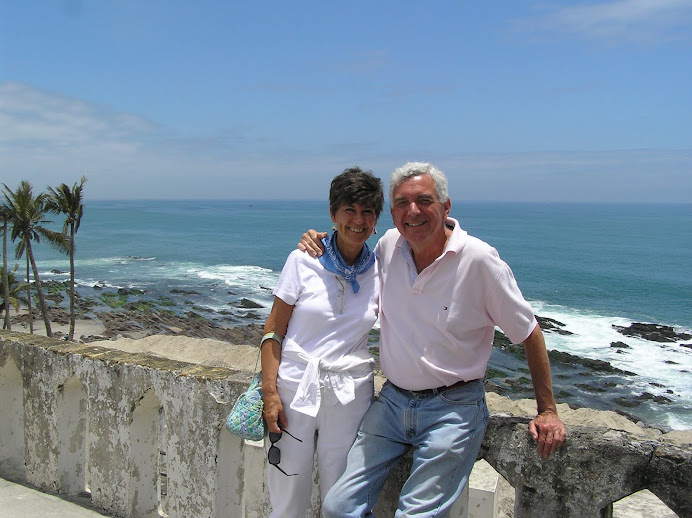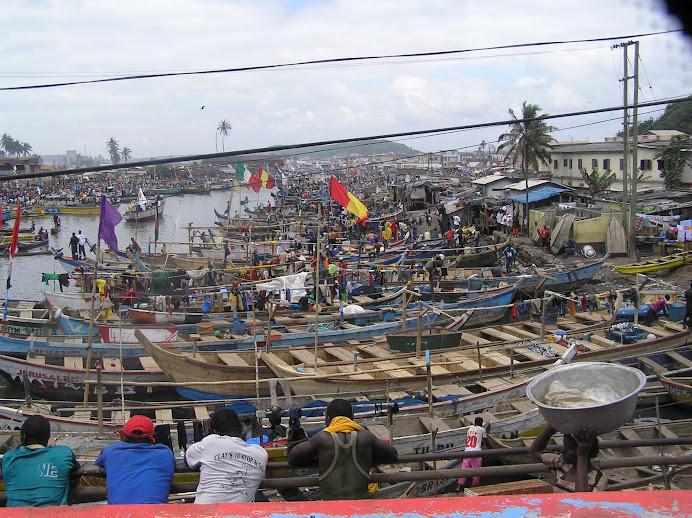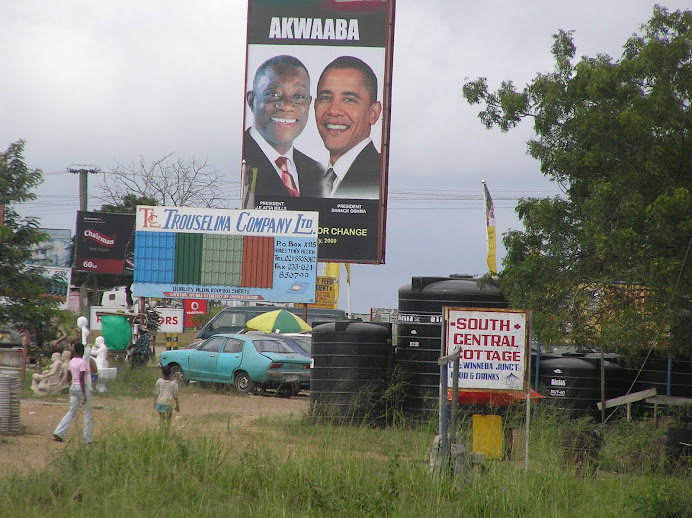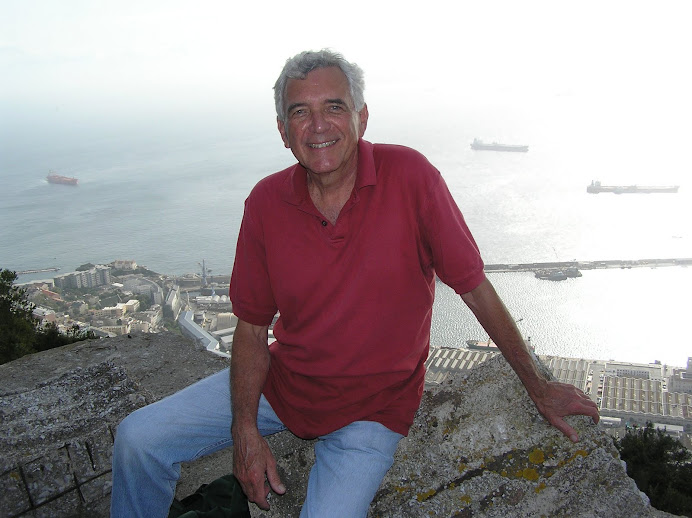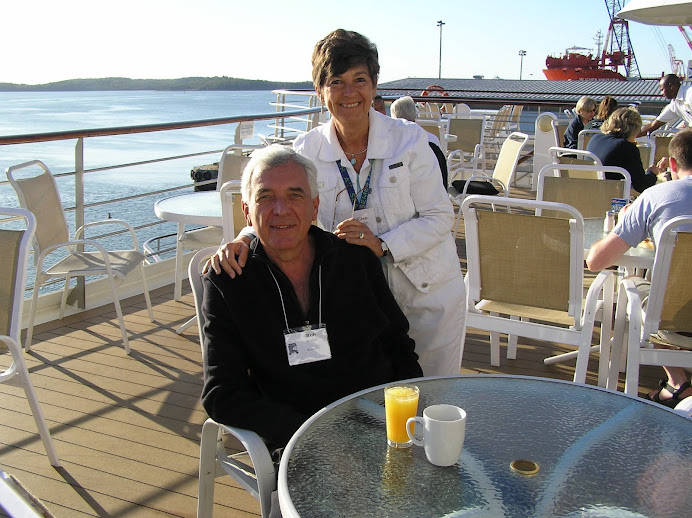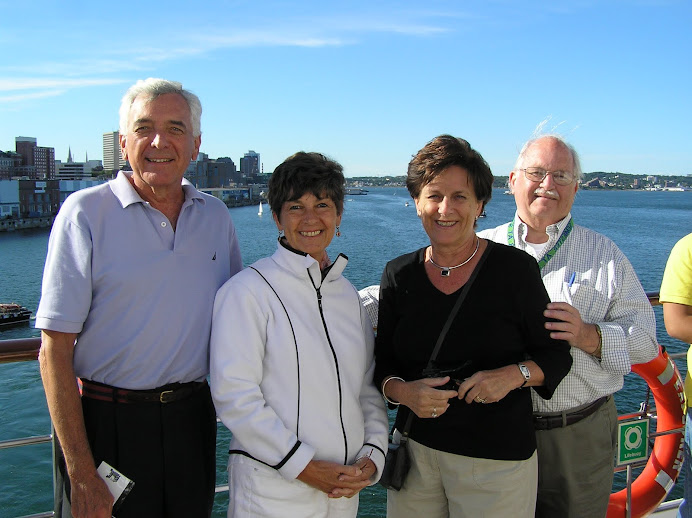New photos at bottom and along side.
The most popular man in Ghana is, without a doubt, Barack Obama.Every one asks about him the minute they see us. We stand out because those of us who are white are the only white people any where we go in the country. There are huge billboards along every road with pictures of Obama, many depict him beside a local, or at least a Ghanaian, politician. Any connection with Obama will bring them votes.
The Ghanaian people are friendly and gracious to us everywhere.They want to talk with us and get to know us. They are all happy that we have come to their country. Everyone on the ship was treated well where ever they went in Ghana.
Their teeth are stark white and shinning and perfect--far better than our own. They all brush their teeth with the bark of a particular tree that is cut into a brush-like shape. Apparently this bark has medicinal powers for teeth. I can't believe no one has yet cut downall of these trees and shipped them to Europe and America--we seem to have striped the land of everything else for our own benefit. Don't tell anyone so maybe they can keep their teeth brushing trees. We all wish these warm and friendly people the very best.
In spite of companies such as Nestle having factories here, most people are unemployed or earning less than they need to live on. Some guides quoted unemployment at 50% We could see for ourselves that it was very high. It costs $60 a month for an apartment in Accra, but most people can't afford it because they have to pay two years in advance before they can move in. So many sleep on the ground in front of their small shops. Many shops are too small to get into to sleep.
Street hawking is illegal--which makes all of us laugh because there are hundreds of people on the sides of the road who run into the street selling anything you can think of. Imagine emptying out a whole Walmart (one with a grocery store) and putting item by item, each product piled high on someones head for them to carry out to the street to sell. Just to be clear there are no Walmart Stores in Ghana--no big stores of any kind. The business are small ones in small sheds, too small to enter, that sell one thing (often stacked in front of the shop)for example, chairs,all alike, beds, all hand-made and all alike, limes only, bananas only, cinder blocks only. cement only, used tires, chocolate candy,plantain chips...
I find it hard to understand why there are so many cars in such a poor country. There are taxis, vans, many mopeds, small motorcycles, some bicycles, trucks... Most people walk. So you get the idea of how many people live here--millions.The sides of the roads and the cities are teeming with masses of people walking, many with loads on their heads, lots selling the items on their heads, but others just going home with stuff on their head. The women wear long skirts, and some wear long slacks, men mostly wear long pants, children all wear school uniforms and look neat (as in clean and tidy). There are many private church-related schools, but some public schools which also require uniforms. The public schools are not comparable to the private schools. Illiteracy is high, I don't have a percentage. All babies and toddlers are carried, mostly by woman and mostly on their backs in cloth. The children everywhere run up to us and want to talk with us, love the cameras and love to pose, and are delighted to look at the camera and see a picture of themselves. Fortunately for us the official language of Ghana is still English (because it was part of the British Empire until 1957) so we have no troublespeaking with people. All of these people speak their own ethnic language at home, and most speak several local languages.
Religion in Ghana is visible everywhere. The majority of people(60% or more) are Christan--mostly evangelical, fundamental. The missionaries have done their work. They were even here, living in the castles housing slaves packed into dungeons, holding services while inhuman practices were going on around them. The tiny shops along the roads have names such as, "Jesus Saves" Tires, "Psalm 24" Tomatoes,"God Loves You" Cement, etc.. There are many church-related schools,Methodist, LDS, Jehovah's Witness, Anglican...I saw many of them with all of their students in uniforms. Muslims are about 16%, Catholics are here. The main thing is that religious freedom reigns in Ghana, individuals here choose to participate in whatever church they want. And almost everyone chooses to belong to a church. The churches seem to be as poor as the people. No grand cathedrals or huge, beautiful mosques (as in Casablanca) here.
- From Ellen
- Rob and I are going around the world on the 100th voyage of Semester at Sea. We board our ship, the MV Explorer, a floating college campus, in Norfolk, VA on August 24 with the rest of the 30 faculty members and their families. We arrive in our first port, Hallifax, Novia Scotia, on August 27 where 650 college students from 250 colleges and universities come on board to begin their Semester at Sea, for which they earn credit toward their bachelors degrees. When you are on the Interactive map, you can click on each port to see when we are there and see information about each port.
Wednesday, September 30, 2009
Wednesday, September 23, 2009
Ghana
We are in port about a 30 minute bus ride to Accra, Ghana. Rob and went on a trip yesterday with our Dean, Bob Chapel, and his wife and other faculty and students to the Communications College of the University of Ghana. We were treated as honored guests. We were ushered from the bus to chairs set up in the shade to watch a very lively performance of dance and music by about 9 young men and 4 young woman who looked to be students. They had matching cotton costumes and looked as if they loved every minute of the performance. I can't imagine how they had the energy to dance so hard and so fast every second for about 30 minutes. We all enjoyed the performance. Then were were ushered up stairs to have a typical Ghanaian lunch (feast is more like it). The food was very good. Their own food is quite spicy hot, so they had some plain rice and a few not spicy dishes which I think were just for us. We ate at round tables with their own college students and faculty mixed in with ours. After lunch they had a lecture for us by one of their faculty members. Then more dancing and singing and drum playing before we left. The official language is English, but each of the hundred or so ethnic groups (they do not use the word "Tribe" and are, in fact, offended by it) has its own language. The student seated next to me spoke five languages and had never been out of Ghana, maybe not even far out of Accra. Some students live in a dormitory, but many live in Accra with their families (as did the student next to me).
The road in from the ship is a nice big highway, in good repair. What we saw on the about 45 minute drive to the College a great deal of poverty--many huts and small (tiny) business made haphazardly of wooden boxes and such with corrugated metal roofs. We passed over a hundred people selling things by the side of the road. At stop lights they ran into the street selling things to the people in cars. Here are some of the items I remember being sold, banana chips, bread (as in wonder bread type bread in plastic bags, cold drinks--coca cola and such--, soccer balls, pretzels, melons, and maps. More was for sale. Apparently local people by food and such from these vendors. Many vendors or most had large bowls or trays balanced on their heads. Mostly woman, but also many men. They were all very good a balancing heavy loads on their heads. Other people walking in the streets used their heads to carry heavy loads.
The traffic was heavy, so there are lots of cars here. The local industry includes a Coca-cola plant, a Nestles Plant, Steel plants, all using local natural resources. The coco plant thrives here, even though it is not native to Ghana, and coco beans are the largest part of the Ghanaian economy. You probably already know that Ghana is rich in natural resources including gold, diamonds, bauxite, coco beans--and now oil has been discovered off shore. Ghana has a wealth of natural resources enriching the Colonial powers originally (the English, Dutch, French) but not the people of Ghana who are quite poor. Now foreign investors now reap the rewards of Ghanaian resources. We Semester at Sea people hope that the Ghanaians will find a way to share in the money from the new-found oil. Ghana does no have the money to invest nor the expertise among its people to drill for the oil. Could the oil be one of the many reasons Obama came here? I am not speaking against our President. Ghana is the safest, most democratic, and possibly the least poor country in Africa--all things Obama would want to encourage. Being less poor does not keep Ghana from being grindingly poor. There are some wealthy and some middle class Ghanaians, but the vast majority are not.
I don't ever in my life remember being in such a racially homogeneous group of people.
Lunch time.
The road in from the ship is a nice big highway, in good repair. What we saw on the about 45 minute drive to the College a great deal of poverty--many huts and small (tiny) business made haphazardly of wooden boxes and such with corrugated metal roofs. We passed over a hundred people selling things by the side of the road. At stop lights they ran into the street selling things to the people in cars. Here are some of the items I remember being sold, banana chips, bread (as in wonder bread type bread in plastic bags, cold drinks--coca cola and such--, soccer balls, pretzels, melons, and maps. More was for sale. Apparently local people by food and such from these vendors. Many vendors or most had large bowls or trays balanced on their heads. Mostly woman, but also many men. They were all very good a balancing heavy loads on their heads. Other people walking in the streets used their heads to carry heavy loads.
The traffic was heavy, so there are lots of cars here. The local industry includes a Coca-cola plant, a Nestles Plant, Steel plants, all using local natural resources. The coco plant thrives here, even though it is not native to Ghana, and coco beans are the largest part of the Ghanaian economy. You probably already know that Ghana is rich in natural resources including gold, diamonds, bauxite, coco beans--and now oil has been discovered off shore. Ghana has a wealth of natural resources enriching the Colonial powers originally (the English, Dutch, French) but not the people of Ghana who are quite poor. Now foreign investors now reap the rewards of Ghanaian resources. We Semester at Sea people hope that the Ghanaians will find a way to share in the money from the new-found oil. Ghana does no have the money to invest nor the expertise among its people to drill for the oil. Could the oil be one of the many reasons Obama came here? I am not speaking against our President. Ghana is the safest, most democratic, and possibly the least poor country in Africa--all things Obama would want to encourage. Being less poor does not keep Ghana from being grindingly poor. There are some wealthy and some middle class Ghanaians, but the vast majority are not.
I don't ever in my life remember being in such a racially homogeneous group of people.
Lunch time.
Monday, September 21, 2009
Ghana tomorrow
James Godfrey saw a hammer-head shark swimming along beside the ship yesterday. Poor thing won't get much--we dump no garbage, actually nothing at all into the sea--we are an environmentally friendly ship. We make our own water for drinking, bathing, brushing teeth, etc. out of sea water. It all looks and tastes just fine. The water goes through a number of filtering processes that work well for us. Then in port we buy all the water we need while we are there. So we have no laundry service in port and are asked to conserve every drop we can.
Last night we went to a fancy dinner in a lovely private dinning room to say farewell to five people among the Life Long Learners and faculty who are leaving the ship in Ghana. They all had signed on for just a part of the voyage, so their departure had been planned from the beginning. Still they seemed sad to be leaving. Those of us attending the dinner had been specifically invited by one of the five. Linda Davis, a faculty member from the Bahamas who teaches at the University of the Bahamas, invited us. These special gourmet dinners cost $25 a person and we all paid our own way. I am glad I get to be on board for the whole vouyage.
Rob and I are already saying we want to come back to Semester at Sea for more voyages. There is one around the Mediterranean, one through the Panama Canel, one to the Carabean, and one to South America. So our particular itennery is by no means they only choice. The ship is always on the move with different length voyages. The whole semester trips, such as ours, take almost 4 months and are the longest. We ae on the fall voyage--the spring semester voyage reverses or itinerary.
By the way, our visit to Ghana is quite special because we are the largest group of Americans to visit Ghana at one time ever. Semester at Sea has never been here before, so we are blazing a trail for them. President Obama, I guess, blazed a trail for us (though he was by no means the first American to visit--maybe the first American President?). We have a Ghanian faculty member and a Ghanian student who were brough on board at Casablanca to ride with us and to teach us about Ghana before we disembark there. We get such experts before most ports.
Last night we went to a fancy dinner in a lovely private dinning room to say farewell to five people among the Life Long Learners and faculty who are leaving the ship in Ghana. They all had signed on for just a part of the voyage, so their departure had been planned from the beginning. Still they seemed sad to be leaving. Those of us attending the dinner had been specifically invited by one of the five. Linda Davis, a faculty member from the Bahamas who teaches at the University of the Bahamas, invited us. These special gourmet dinners cost $25 a person and we all paid our own way. I am glad I get to be on board for the whole vouyage.
Rob and I are already saying we want to come back to Semester at Sea for more voyages. There is one around the Mediterranean, one through the Panama Canel, one to the Carabean, and one to South America. So our particular itennery is by no means they only choice. The ship is always on the move with different length voyages. The whole semester trips, such as ours, take almost 4 months and are the longest. We ae on the fall voyage--the spring semester voyage reverses or itinerary.
By the way, our visit to Ghana is quite special because we are the largest group of Americans to visit Ghana at one time ever. Semester at Sea has never been here before, so we are blazing a trail for them. President Obama, I guess, blazed a trail for us (though he was by no means the first American to visit--maybe the first American President?). We have a Ghanian faculty member and a Ghanian student who were brough on board at Casablanca to ride with us and to teach us about Ghana before we disembark there. We get such experts before most ports.
Saturday, September 19, 2009
at sea off Senegal
We have seen some life in the sea and recently quite a few ships (a handful actually--but that is a lot for us). Yesterday we were 30 miles off Senegal and were getting a butterfly and some actual bugs from land. At dusk, Carla Tolbert sat on the deck with our second after dinner cup of tea. Visiting after meals is one of the pleasures of being at sea with interesting and nice people. Bugs had landed on the deck in great mass before Rob and Charlie left to go prepare their classes for the next day. Carla and I have time to do as we wish since we are not teaching. The bugs were small--about 1/8 inch long, pale green, and shaped a bit like tiny grasshoppers. Earlier we had all been delighted to see a butterfly. At dusk something (bugs)started biting us (Carla and Me) so we dashed inside. Rob insists that we were just bitten by gnats. Whatever they were, no harm seems to have been done. We were having a strong wind from off shore. I don't know what our distance from shore was at that point. We think the insects were blown in mass our way by the strong wind. Yesterday we saw no bugs at all--but Rob and I did eat inside on deck 5 with two students who had invited us to join them for dinner. It was fun.
On the way to Cadiz from Halifax I saw a dolphin and others saw more dolphin. Off the horn of Africa (where we are now) we have seen lots of flying fish, lots of dolphin, small white birds, several heron (white, but larger than the little white birds). Crossing the Atlantic, we saw no birds or bugs. Everyone keeps an eye on the ocean to see what we can see. No one has seen a whale or any other fish. The flying fish flap their very thin (gossamer comes to mind) fins to keep them in the air for about five times their own length or more). We have also seen more other ships than we are used to seeing; plus we saw one actual fishing boat.
We haven't yet started taking our malaria pills for Ghana. We are supposed to start them two days before we reach the port of Ghana--so tomorrow, I think. Then we take them the whole time we are in Ghana and then a week after. I know we repeat this procedure for Viet Nam because we are going into the Jungles of Cambodia to Angkor Watt (sp?) and we may need to do it for South Africa.
Today the students have no classes. They were getting a bit overwhelmed with their assignments, so they have a day to catch up on class work and sleep. There is a group who party every night on the seventh deck (near the pool). We had a talent show last night. Rob did not participate--then regretted it while he watched the show. He has a bad cold and well as lots of work grading papers and getting ready for class. Bob and Maria Chapel have had the same terrible cold for at least a week, more like ten days. The three of them have been very tired and felt terrible--but they have all kept going the whole time. I have been washing my hands like Lady Macbeth to keep from catching it. So far I am fine--but I wish Rob would get well and stop coughing so much both for his sake and, selfishly, for mine. Now Cindy has it--she is a prof from Colorado with porcelain skin--its lovely.
Rob just came by--I am in the computer room--to say more bugs--ugh. We like to eat outdoors and it is lunch time.
Bye for now.
On the way to Cadiz from Halifax I saw a dolphin and others saw more dolphin. Off the horn of Africa (where we are now) we have seen lots of flying fish, lots of dolphin, small white birds, several heron (white, but larger than the little white birds). Crossing the Atlantic, we saw no birds or bugs. Everyone keeps an eye on the ocean to see what we can see. No one has seen a whale or any other fish. The flying fish flap their very thin (gossamer comes to mind) fins to keep them in the air for about five times their own length or more). We have also seen more other ships than we are used to seeing; plus we saw one actual fishing boat.
We haven't yet started taking our malaria pills for Ghana. We are supposed to start them two days before we reach the port of Ghana--so tomorrow, I think. Then we take them the whole time we are in Ghana and then a week after. I know we repeat this procedure for Viet Nam because we are going into the Jungles of Cambodia to Angkor Watt (sp?) and we may need to do it for South Africa.
Today the students have no classes. They were getting a bit overwhelmed with their assignments, so they have a day to catch up on class work and sleep. There is a group who party every night on the seventh deck (near the pool). We had a talent show last night. Rob did not participate--then regretted it while he watched the show. He has a bad cold and well as lots of work grading papers and getting ready for class. Bob and Maria Chapel have had the same terrible cold for at least a week, more like ten days. The three of them have been very tired and felt terrible--but they have all kept going the whole time. I have been washing my hands like Lady Macbeth to keep from catching it. So far I am fine--but I wish Rob would get well and stop coughing so much both for his sake and, selfishly, for mine. Now Cindy has it--she is a prof from Colorado with porcelain skin--its lovely.
Rob just came by--I am in the computer room--to say more bugs--ugh. We like to eat outdoors and it is lunch time.
Bye for now.
Wednesday, September 16, 2009
at sea
We are at sea again, rounding the horn of Africa from Morocco to Accra, Ghana. The trip will take about eight days.
I love being at sea. Interesting classes and lots going on--the on ship community is great. No worries about getting sick from the food or water, easy to communicate (everyone speaks English). Being in port takes us into places Rob and have never seen and is exciting--then returning to the ship is like going home again.
We had our first dinner with our extended family--Rob and I have adopted five students as part of an on ship program. Over three hundred students signed up wanting to be adopted. By the time the ship left Halifax we had only 520 students. We figure the bad economy played a role here--the ship can accommodate 750. Our adopted students are terrific. They want to get together more than once a week and all are very enthusiastic. I passed two of them today one at a time and we were all very glad to see each other. A number of other students have became special to us also.
The port of Morocco is large and very industrial looking--lots of cement and huge cranes. Rats running around also. The ropes that tied us to the dock had rat deterrents. a large cup like thing that blocked them from entering and was painted to look just like the open mouth of a huge cat I'd say it works--none of us has ever seen a single rat on board.
I went up by the pool for a while this afternoon. It was too hot to stay long. I did put my feel in the cool pool water. The pool is emptied every time we go into port and then filled with fresh sea water when we head out to sea again. So the water has been very cold so far. Today it had warmed up enough that lots of students were getting in and splashing around.
I love the view of ocean all around us. I saw a tanker from the deck during lunch.
I love being at sea. Interesting classes and lots going on--the on ship community is great. No worries about getting sick from the food or water, easy to communicate (everyone speaks English). Being in port takes us into places Rob and have never seen and is exciting--then returning to the ship is like going home again.
We had our first dinner with our extended family--Rob and I have adopted five students as part of an on ship program. Over three hundred students signed up wanting to be adopted. By the time the ship left Halifax we had only 520 students. We figure the bad economy played a role here--the ship can accommodate 750. Our adopted students are terrific. They want to get together more than once a week and all are very enthusiastic. I passed two of them today one at a time and we were all very glad to see each other. A number of other students have became special to us also.
The port of Morocco is large and very industrial looking--lots of cement and huge cranes. Rats running around also. The ropes that tied us to the dock had rat deterrents. a large cup like thing that blocked them from entering and was painted to look just like the open mouth of a huge cat I'd say it works--none of us has ever seen a single rat on board.
I went up by the pool for a while this afternoon. It was too hot to stay long. I did put my feel in the cool pool water. The pool is emptied every time we go into port and then filled with fresh sea water when we head out to sea again. So the water has been very cold so far. Today it had warmed up enough that lots of students were getting in and splashing around.
I love the view of ocean all around us. I saw a tanker from the deck during lunch.
Sunday, September 13, 2009
Casablanca and Marrakech
Scroll to the bottom to see two photos of us that I have managed to attach there. I want them along the side--but have to figure out how to do that. I will keep trying and at least keep adding to the bottom. The two photos are Rob and me on the stern deck where we love to have our meals and Rob and me with Carla and Charlie Tolbert, our friends from Charlottesville, on deck as we leave Halifax. We had dinner last night and breakfast this morning with Charlie and Carla and both meals we four just sat and talked for an hour or more after the meal was over. We have a great time with them. We are obviously in port now, which is they only free time we have.
The four of us have just gotten back (last night in time for dinner) from Marrakesh where we spent one night. Charlie was the bus leader for the big bus, and Rob and I were on the small bus. The small bus was fantastic. It was small enough that we had bus-wide conversations that included us, the young couple who work in administration on the ship, and 14 students. Morgoan, a student who is a born entertainer, organized the games and well as keeping us laughing. We all played categories which, believe it or not, was hilarious and great fun. Then we played a card game in which half of us were citizens and half mafia, one was a sheriff (me) and one a nurse. Anyway the mafia won.
The drive to Marrakesh from Casablanca took about three hours. The countryside looked a lot like Southern Spain--like Mexico or New Mexico--arid with scrub brush, mostly hilly with mountains near Marrakesh. The farm houses were sometimes completely surrounded by trees and green (looking like an oasis. Some just had a little green or trees on one side or another and looked much less prosperous. I saw a place I thought was a ruin--no green and very run-down. Then I saw people and realized that they lived there. We saw Moroccan flags galore as we approached Marrakesh ad or guide proudly told us they meant that the King was in town. He says the King is very popular.
Our students, took seriously all they had been told about Moroccan culture and dressed appropriately. In Spain they were told to dress modestly for the Catholic majority (95%) and they wore lots of short shorts and tank tops and flip flops. Here they were admonished to cover themselves and always travel in groups, preferably with a male along. They did, long sleeves, long pants, no lavish jewelry, etc. The girls were told that they would mark themselves for harassment by men if they did not. They did exactly as was suggested, all of them. Rob made sure to look out after students anytime he has been out. Morocco has 98.25 Muslims and .5% Christan. They have a 50% overall literacy rate, with 80% illiteracy for females. People in the cities have a higher literacy rate than those living in the country. The literacy rate is improving--just a few years ago only 30% of the entire population could read and write. The farmers use what our guide called the-old-fashioned way--if it rains, the crops get water, if not, they are dry. The same farming methods that have been used for thousands of years are what they use today. Our guide says the King wants to improve literacy and many new schools have been built where before there were none. We were taken to see a new school where gardening is taught so that they poor children from the settlements could learn a marketable skill. Our guide pointed out that the countryside is used for agriculture.
We saw minarets and Mosques in every village and many is the towns of Casablanca and Marrakesh, which are big, modern cities. Our port here in Casablanca could easily be in Norfolk.
Security is tight around the ship everywhere we go. There is always a gate in ports where we have to show ID to get in and out of, we also have to show our ship ID and swipe our ship ID card to get off or come aboard. Two or thee ship security people make sure we sign in properly and they go through our bags and purses before we can go in from the gangway. Mostly they are looking for food products or liquids (especially alcohol for the students--but all of us are searched). We have to pour out the water from our water bottles before we can bring them aboard. Here in Casablanca we have two local police at the foot of our gangway at all times plus two police cars parked at our bow and one police car parked at our stern.The police cars all have two officers in them. We think we are being protected from terrorists. Our captain tells us that our ship has a high level of security in all ports. I am glad to have the protection and do not object to the inconvenience of being searched and showing ID.
More later.
The four of us have just gotten back (last night in time for dinner) from Marrakesh where we spent one night. Charlie was the bus leader for the big bus, and Rob and I were on the small bus. The small bus was fantastic. It was small enough that we had bus-wide conversations that included us, the young couple who work in administration on the ship, and 14 students. Morgoan, a student who is a born entertainer, organized the games and well as keeping us laughing. We all played categories which, believe it or not, was hilarious and great fun. Then we played a card game in which half of us were citizens and half mafia, one was a sheriff (me) and one a nurse. Anyway the mafia won.
The drive to Marrakesh from Casablanca took about three hours. The countryside looked a lot like Southern Spain--like Mexico or New Mexico--arid with scrub brush, mostly hilly with mountains near Marrakesh. The farm houses were sometimes completely surrounded by trees and green (looking like an oasis. Some just had a little green or trees on one side or another and looked much less prosperous. I saw a place I thought was a ruin--no green and very run-down. Then I saw people and realized that they lived there. We saw Moroccan flags galore as we approached Marrakesh ad or guide proudly told us they meant that the King was in town. He says the King is very popular.
Our students, took seriously all they had been told about Moroccan culture and dressed appropriately. In Spain they were told to dress modestly for the Catholic majority (95%) and they wore lots of short shorts and tank tops and flip flops. Here they were admonished to cover themselves and always travel in groups, preferably with a male along. They did, long sleeves, long pants, no lavish jewelry, etc. The girls were told that they would mark themselves for harassment by men if they did not. They did exactly as was suggested, all of them. Rob made sure to look out after students anytime he has been out. Morocco has 98.25 Muslims and .5% Christan. They have a 50% overall literacy rate, with 80% illiteracy for females. People in the cities have a higher literacy rate than those living in the country. The literacy rate is improving--just a few years ago only 30% of the entire population could read and write. The farmers use what our guide called the-old-fashioned way--if it rains, the crops get water, if not, they are dry. The same farming methods that have been used for thousands of years are what they use today. Our guide says the King wants to improve literacy and many new schools have been built where before there were none. We were taken to see a new school where gardening is taught so that they poor children from the settlements could learn a marketable skill. Our guide pointed out that the countryside is used for agriculture.
We saw minarets and Mosques in every village and many is the towns of Casablanca and Marrakesh, which are big, modern cities. Our port here in Casablanca could easily be in Norfolk.
Security is tight around the ship everywhere we go. There is always a gate in ports where we have to show ID to get in and out of, we also have to show our ship ID and swipe our ship ID card to get off or come aboard. Two or thee ship security people make sure we sign in properly and they go through our bags and purses before we can go in from the gangway. Mostly they are looking for food products or liquids (especially alcohol for the students--but all of us are searched). We have to pour out the water from our water bottles before we can bring them aboard. Here in Casablanca we have two local police at the foot of our gangway at all times plus two police cars parked at our bow and one police car parked at our stern.The police cars all have two officers in them. We think we are being protected from terrorists. Our captain tells us that our ship has a high level of security in all ports. I am glad to have the protection and do not object to the inconvenience of being searched and showing ID.
More later.
Thursday, September 10, 2009
Casablanca
We left the port of Cadiz night before last and traveled to Gibraltar where we spent most of yesterday refueling.
We had traveled to Gibraltar (by bus from Cadiz) and had a wonderful time exploring the top of the Rock. We went up and down the Rock by Cable Car and had a fabulous view. I loved seeing the ships at anchor off of Gibraltar. The monkeys on the Rock are famous (or infamous)--they steal food if they know you have it and they bite. A girl from our ship got a monkey bite. She had to have a tetanus shot--but not rabies, because the monkeys are all vaccinated. The story goes that because of a local saying that when the monkeys leave Gibraltar, the British will leave ( I think) it was Winston Churchill visited Gibraltar and found the monkeys dead and dying of disease. He had the ones left taken to the human hospital in Gibraltar and nursed back to health and then had more apes (everyone calls them monkeys, but they are actually apes) sent over from Africa to replace the ones that died.
Gibraltar has almost a monopoly on supplying fuel to ship because they do it for much less money than any other port. We took on 520,000 tons of petroleum fuel.We left Gibraltar in the evening and woke up this morning pulling into the port of Casablanca.
Time to go explore Casablanca!
We had traveled to Gibraltar (by bus from Cadiz) and had a wonderful time exploring the top of the Rock. We went up and down the Rock by Cable Car and had a fabulous view. I loved seeing the ships at anchor off of Gibraltar. The monkeys on the Rock are famous (or infamous)--they steal food if they know you have it and they bite. A girl from our ship got a monkey bite. She had to have a tetanus shot--but not rabies, because the monkeys are all vaccinated. The story goes that because of a local saying that when the monkeys leave Gibraltar, the British will leave ( I think) it was Winston Churchill visited Gibraltar and found the monkeys dead and dying of disease. He had the ones left taken to the human hospital in Gibraltar and nursed back to health and then had more apes (everyone calls them monkeys, but they are actually apes) sent over from Africa to replace the ones that died.
Gibraltar has almost a monopoly on supplying fuel to ship because they do it for much less money than any other port. We took on 520,000 tons of petroleum fuel.We left Gibraltar in the evening and woke up this morning pulling into the port of Casablanca.
Time to go explore Casablanca!
Saturday, September 5, 2009
Cadiz, Spain
We have crossed the Atlantic and are in the port of Cadiz--which is right in the heart of the city. You could throw a baseball from the ship and have it land in the old town. This city has quite a History. They have found bones of people who lived here 900 to 800 BC. The Phoenicians settled here and founded the current city about 1100 AD. The Carthaginians had already been here and they have recently unearthed a Roman amphitheater which dates back to about 100AD. For hundreds of years the Jews, Christians, and Muslims lived here side by side (each maintaining their own culture) without conflict. Then Ferdinand and Isabella (yes, indeed, the same ones who sent Christopher Columbus across the ocean blue) married, uniting several Spanish kingdoms. She was very strongly catholic, and had all the Jews and Muslims evicted from the country. The Spanish Inquisition began then. Now Spain is 95 percent catholic, so I'd say, she achieved her goal. And we thought she was so nice.
Cadiz is a beautiful city with lovely parks and a nice beach right on the Atlantic Ocean. We have been into town once on Rob's FDE (Faculty Directed Practicum) to "The Churches of Cadiz". Now we are going to walk back to look around on our own.
Cadiz is a beautiful city with lovely parks and a nice beach right on the Atlantic Ocean. We have been into town once on Rob's FDE (Faculty Directed Practicum) to "The Churches of Cadiz". Now we are going to walk back to look around on our own.
Friday, September 4, 2009
at sea--tomorrow Cadiz, Spain
Rob is teaching his Religious Freedom class right now and I am in the computer center writing you. Did you know that the US State Department has a Religious Freedom Site for many countries on its web site. Rob's students are assigned to check the site for all the information available at this site for each country as we approach port.
We had a "cultural preport", required attendance for all of us on this voyage. We have five faculty members and two students from Spain--so they ran a very thorough and funny program for us. Spanish ham is something must try, we were told, even vegetarians will like it. their was a great emphasis on footwear--no white sox, no sox with sandals, and no tennis shoes, especiall white. All will signal to pick pockets that we are western tourists, and all will totally embarrass our spanish faculty and students.
I just noticed the time. I must grab some lunch and head for my noon class. Where did the time go?
We had a "cultural preport", required attendance for all of us on this voyage. We have five faculty members and two students from Spain--so they ran a very thorough and funny program for us. Spanish ham is something must try, we were told, even vegetarians will like it. their was a great emphasis on footwear--no white sox, no sox with sandals, and no tennis shoes, especiall white. All will signal to pick pockets that we are western tourists, and all will totally embarrass our spanish faculty and students.
I just noticed the time. I must grab some lunch and head for my noon class. Where did the time go?
Wednesday, September 2, 2009
at sea
We are more than half way from Halifax to Cadiz, our next port. Last night we were north of the Azores. The air and water temperatures are getting warmer, though we have had two days of rain.
I have been to the Global Studies class twice--we all take it. The first was more interesting than the second. Just that I already knew the stuff. I guess he had to slow down the content so the students could keep pace--they haven't lived as long as he rest of us, so haven't been exposed to as much as we have.
I went to Rob's class yesterday on Global Influences on the US South. He has written a book on the subject, so that is one of their texts. The class was great. Rob got all the students talking--most are from the South. Rob says he wants to bring out the boy from NY and get him talking more. A half dozen or so Lifelong Learners ( the grown-ups who are taking the voyage as passengers) were also in the class and they piped up and contributed only after the students has wrestled with a subject. Slavery and its influence was a big part of the class discussion. The Lifelong Learners could tell the students about race relations in their childhood, which the students hadn't experienced and didn't know much about. The whole class time was interesting and never dull and never antagonistic.
This afternoon I am going to a class about Women and Movement taught by my brand new Iranian friend, Farzoneh Milani. Women and Islam is her area of expertise. She is quite a scholar and teaches at UVA. Her husband died two years ago and she was a little bit lonely and feeling left out not to be a part of a couple at first, so Rob and I took her with us walking all over Halifax. We seek her out at meals and sit with her at meetings. She is lovely, and is the best dressed woman on the ship. I always enjoy her company.
Tonight Rob and I have been invited to dine with the Captain. All the faculty and Lifelong Learners will be invited sooner or later. Carla Tolbert and her husband, Charlie, are going tonight, too, as is Farzoneh. We dress up (we were told ahead to bring appropriate clothes for the occasion). Carla and Charlie have been our friends for over 30 years--we spend a lot of time with them. Carla and I agreed before the trip to bring books to read and then share with each other. I have already passed on to her the wonderful novel by Robert McNeil about the Halifax explosion, which his parents and grandparents lived through I highly recommend Burden of Desire. Carla and Charlie are the parents of one of Hailey's closest childhood friends, Michelle Tolbert. Charlie teaches three Astronomy courses. He just retired from UVA. I hear lots of good things about his classes, Farzoneh's, and Rob's.
All the teachers were hand selected because they are good. Bob Chapel, of the UVA Drama Department, is our Academic Dean. He says his greatest strength has always been in casting--and he is pleased as punch with the job he did selecting the faculty for this floating university. This afternoon I am going to a class taught by Jahan Ramazoni and his wife Caroline Rody, also good friends. They have brought their three children with them. Jahan's father was a mid-east expert on the UVA faculty. Hailey says Jahan, who teaches in the English Department, is the best teacher he has ever had, and Jahan says Hailey is among the best and most brilliant students he has ever known. You can just imagine how much I adore him.
Rob doesn't seem to get sea sick at all. I have had headaches and once I learned that they can be a symptom of sea sickness, I have taken Meclazine and the headaches stopped.
I have been to the Global Studies class twice--we all take it. The first was more interesting than the second. Just that I already knew the stuff. I guess he had to slow down the content so the students could keep pace--they haven't lived as long as he rest of us, so haven't been exposed to as much as we have.
I went to Rob's class yesterday on Global Influences on the US South. He has written a book on the subject, so that is one of their texts. The class was great. Rob got all the students talking--most are from the South. Rob says he wants to bring out the boy from NY and get him talking more. A half dozen or so Lifelong Learners ( the grown-ups who are taking the voyage as passengers) were also in the class and they piped up and contributed only after the students has wrestled with a subject. Slavery and its influence was a big part of the class discussion. The Lifelong Learners could tell the students about race relations in their childhood, which the students hadn't experienced and didn't know much about. The whole class time was interesting and never dull and never antagonistic.
This afternoon I am going to a class about Women and Movement taught by my brand new Iranian friend, Farzoneh Milani. Women and Islam is her area of expertise. She is quite a scholar and teaches at UVA. Her husband died two years ago and she was a little bit lonely and feeling left out not to be a part of a couple at first, so Rob and I took her with us walking all over Halifax. We seek her out at meals and sit with her at meetings. She is lovely, and is the best dressed woman on the ship. I always enjoy her company.
Tonight Rob and I have been invited to dine with the Captain. All the faculty and Lifelong Learners will be invited sooner or later. Carla Tolbert and her husband, Charlie, are going tonight, too, as is Farzoneh. We dress up (we were told ahead to bring appropriate clothes for the occasion). Carla and Charlie have been our friends for over 30 years--we spend a lot of time with them. Carla and I agreed before the trip to bring books to read and then share with each other. I have already passed on to her the wonderful novel by Robert McNeil about the Halifax explosion, which his parents and grandparents lived through I highly recommend Burden of Desire. Carla and Charlie are the parents of one of Hailey's closest childhood friends, Michelle Tolbert. Charlie teaches three Astronomy courses. He just retired from UVA. I hear lots of good things about his classes, Farzoneh's, and Rob's.
All the teachers were hand selected because they are good. Bob Chapel, of the UVA Drama Department, is our Academic Dean. He says his greatest strength has always been in casting--and he is pleased as punch with the job he did selecting the faculty for this floating university. This afternoon I am going to a class taught by Jahan Ramazoni and his wife Caroline Rody, also good friends. They have brought their three children with them. Jahan's father was a mid-east expert on the UVA faculty. Hailey says Jahan, who teaches in the English Department, is the best teacher he has ever had, and Jahan says Hailey is among the best and most brilliant students he has ever known. You can just imagine how much I adore him.
Rob doesn't seem to get sea sick at all. I have had headaches and once I learned that they can be a symptom of sea sickness, I have taken Meclazine and the headaches stopped.
Subscribe to:
Comments (Atom)

